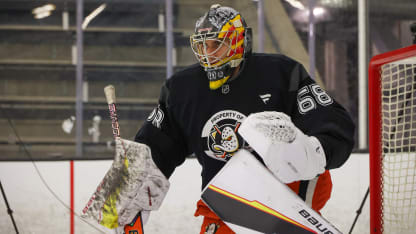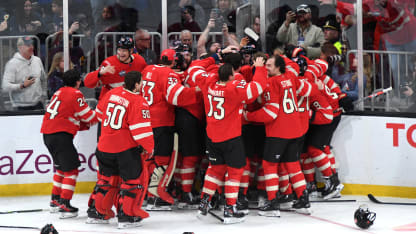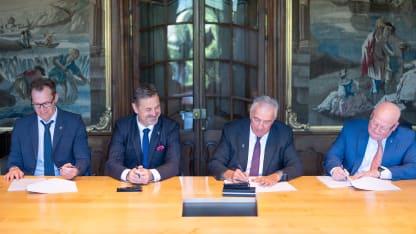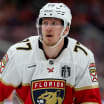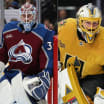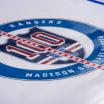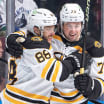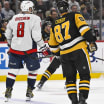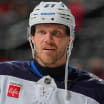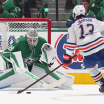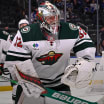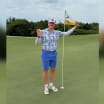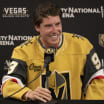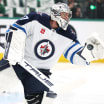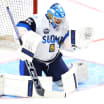NHL players will participate in the Olympic Winter Games Milano Cortina 2026 this February, the first time since 2014 the best players in the world will be on the Olympic stage. NHL.com will post a story each Monday to count down to the 2026 Olympics. Today, a sit-down with Team Finland general manager Jere Lehtinen:
2026 Olympics still 'so very special,' Finland GM Lehtinen says
Has held role since 2014, represented country as player in 5 Winter Games
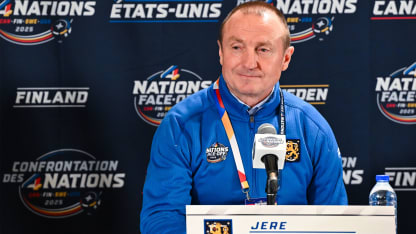
© Minas Panagiotakis/Getty Images
By
Aaron Vickers
NHL.com Independent Correspondent
Jere Lehtinen said he now feels a different pressure when representing Finland on the international stage.
Lehtinen, one of the most decorated players the country has ever produced, still feels the same competitive juices in his capacity as Finland's general manager, a role he has held since 2014.
"It's tough to be up there (in the stands) because you can't do too much up there," said Lehtinen, who is fourth all-time in games played at the Olympics, and has four medals from Olympic competition -- silver at the 2006 Turin Games, and bronze at the 2010 Vancouver Games, 1998 Nagano Games and 1994 Lillehammer Olympics -- in his collection.
"As a player, you can. It's intense. I'm fortunate. I feel that way. I've been part of this so long now as a GM and being part of the Olympics as GM. It's been special. I never thought about that, when I finish my career, OK, maybe I go back to the Olympics and now I've gone through three times and next year is the fourth time. What I've experienced as a player, now these years I can think back to how it was. I enjoy those tournaments, you know, because you never know if it's going to come again. I've been fortunate to be a part of many."
Lehtinen, who had 514 points (243 goals, 271 assists) in 875 games and is a three-time Selke Trophy winner, voted as the NHL's best defensive forward, played 14 seasons with the Dallas Stars from 1995-2010.
He's tasked with assembling the roster that will represent Finland at the Olympic Winter Games Milano Cortina 2026, the first time NHL players will participate at the Games since Sochi in 2014. Lehtinen oversaw Finland's gold medal-winning team at the 2022 Beijing Games. The men's tournament will start with preliminary games Feb. 11, with the gold-medal game scheduled for Feb. 22.
Finland's group will be fronted by forwards Sebastian Aho (Carolina Hurricanes), Aleksander Barkov (Florida Panthers) and Mikko Rantanen (Stars), defensemen Miro Heiskanen (Stars) and Esa Lindell (Stars), and goaltender Juuse Saros (Nashville Predators). Each was named to the preliminary roster June 16.
Finland and Sweden reveal their first 6 representatives for their 2026 Olympic teams
"The Olympics are so very special, every four years," Lehtinen said. "As a kid, all sports fans... that's one of the main events you want to watch. And then you're a part of that. That's why it's special. You have different athletes and different sports and you live in the Olympic Village. Team Finland... you have athletes from different sports but it's a whole team pulling together. Then there's other countries and other athletes there. You're part of a big group. Not just a hockey team. You compete, but it's bigger than just that sport."
Lehtinen recently spoke with NHL.com about lessons learned at the 4 Nations Face-Off, his Olympic history, and what to expect at the 2026 Milano Cortina Games.
You've got a lot of experience at the Olympics as a player. Is there one moment or one game or one medal that stands out?
"It's tough. All five are a little bit different, but of course the first one is the first one. I was a young kid at that time in Lillehammer and we got a bronze there. If you have to say one's special, maybe that because it was my first Olympics. As a kid you were watching the Olympics and now you're playing there and get a medal there. At the same time we had a good run in Turin in 2006. And then the last one, in 2010, I knew that was going to be my last national team games. All five are special. Nagano was the first NHL players were able to play, so that's special, too. You know, every tournament has something, but the first one is the first."
Do you learn more from wins or losses at an event like the Olympics?
"Of course when you are losing you learn, and then you're more ready, basically, when you get in next time. At the same time, when you win, too, there's a side to how you pull out those wins together. Our side, the three bronze... we finished the last game but you lost the semifinal. Then in 2006, of course, that was a tough one because the whole tournament we played well and that's still there, one of the biggest disappointments. At the same time, you can turn it another way. It was a big accomplishment from our team, too. It's one game, and it decides who wins and loses. From there, you go through those and it helps to be more ready when you go next time and play those games."
From a management standpoint, what did the 4 Nations Face-Off teach you?
"We saw what the level of hockey is when you have the best players play against each other, even more because it's been so long that they've been able to play together and against each other. At the same time, it's great. It's back and the Olympics are back, and these players are able to go play the Olympics. I felt bad sometimes, like in 2022 when they couldn't go there, the great players, because it's a special tournament. Not just the hockey, but everything. That's why the 4 Nations set the tone basically for where we're at on best-on-best games looking forward. The teams, us, those players haven't played together much... maybe some World Championships, maybe juniors, before, as a big group. It was a good learning process for us to see how we work together as a group. We had a good time, and everybody was happy, so that helps when we look forward to the Olympics."
Do you change anything in your approach in terms of roster construction after seeing the 4 Nations?
"We haven't gone that deep yet, but of course we talk about it and we have to see during the summer what we have in the NHL and what we have here. I think we have a good group of players and what we can put forth structure-wise. I think we did a good job (at the 4 Nations) and we just got a little unlucky... the defensemen got hurt. That's not an excuse, but that's one part. We hope we can get more NHL defensemen we can choose from."
Does the Olympics afford you a deeper pool to draw from than the 4 Nations with so many players in Europe?
"That's another point, of course. We have good players here in Europe. If you look at past Olympics, every Olympics where NHL players were, there were European players, too. That gives the European players a boost too to show what they have. They have a chance to be one of the players. That's good."
Between the 4 Nations Face-Off, World Championship, Stanley Cup Playoffs, and what you might see to start the season, what influences you the most when it comes to choosing players?
"I think it's altogether. You see how we played there (at 4 Nations) and what we maybe need and what we've done (at Worlds) and you're watching closely, coaching staff and management, how the playoffs go in the NHL and what you need. That's a big part. You have a lot of good players, and when you get those in, how do you put those pieces in the right places in the lineup?"
What should the identity be of a Finnish team competing at the Olympics?
"I think it's what it's been when we've been successful. We have to play a good team game. We know when we stick together and play hard we are hard to play against. Looking through the lineup, we have to play strong defensively, but at the same time we have a lot of good offensive players, too. I think this team has spirit. That's up there with skill."
